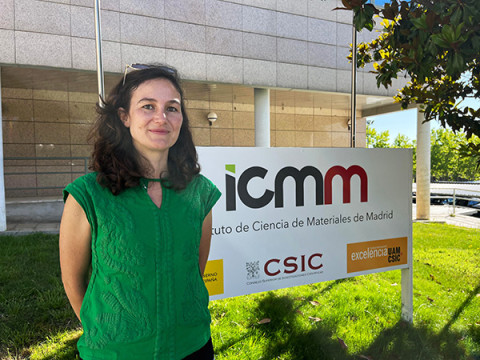Sol Carretero, Awarded Best New Thesis Supervisor at CSIC: "We Must Allow Time for Scientific Self-Development"

"Honestly, I didn’t expect it," says Sol Carretero, unable to hide a broad smile. The researcher from the Institute of Materials Science of Madrid has been chosen by the Spanish National Research Council (CSIC) as the best new supervisor of doctoral theses in the Materials area.
The award, which includes a monetary prize of 2,000 euros, had 48 candidates. "It is a pride for the institution," states the jury's decision, which selected two male and two female winners, with Carretero being the only one in the Materials area. "The award recognizes those who take care of their students and lead them to excellence," notes the ICMM-CSIC scientist.
"My approach to work is characterized by humor, closeness, and deep empathy," describes the researcher about her method of supervising doctoral theses. Carretero understands that her role as a supervisor also involves "creating a safe environment that fosters open communication and critical thinking." "That's what science is about, enabling each person to develop their ideas and critical thinking, to the point where they can even challenge me," she says confidently.
The impact is evident in the people who work with her. "We laugh a lot, we have a great time, and even though they may continue their careers elsewhere, they always want to come back." She describes it simply: "When you feel comfortable, it’s easier to think, to formulate the problem, and that’s how science is done, by allowing time for scientific self-development."
The researcher, who secured a stable position at CSIC less than a year ago, is satisfied with both her work and her way of doing it: "Throughout my career, I have supervised seven Bachelor's theses, four Master's theses, and three doctoral theses," she states. This, to her, is also important because she creates a strong network among her students based on "cascading knowledge." It’s her "little school." She explains it like this: "Doctoral students mentor those doing their Master's, and they in turn help the Bachelor's students, all under my supervision." This approach ensures that these young people "feel free."
"What I feel is that I take care of them, I allow them to speak, I always support them with their future in mind," she states. And she confesses: "Sometimes, selfishly, I’d prefer they stay when they finish their work, but I know there’s a world out there and I support them as much as I can." Additionally, she is particularly proud of always actively supporting their efforts to obtain funding. "Even as a new Principal Investigator, I managed to secure project funding contracts for them," she mentions, and also talks about supporting them in seeking awards for their work, citing Jaime Bueno as an example, who recently started his doctoral thesis with her after being awarded for his Master's thesis, also supervised by her.
She talks about each student who has passed through her "little school" with a smile, recalling anecdotes. For instance, she is particularly proud of Victoria Esteso. She co-supervised her thesis and Master's thesis in Seville: "I remember going to the library with her to study what she wanted to do. Her project opened a novel and risky line with my full support on controlling the Casimir force through the optical properties of materials."
Carretero also participates in mentoring programs, such as the Stem Talent Girl Program, highlighting her commitment to the professional development of young talents. "My approach not only focuses on academic excellence but also on cultivating skills, creating opportunities, and fostering an honest and mentally healthy learning community in constant evolution," she concludes.
Instituto de Ciencia de Materiales de Madrid (ICMM)
Sor Juana Ines de la Cruz, 3
Cantoblanco, 28049
Madrid, España
Telephone: (+34) 91 334 90 00
Email: @email
Communication Office: @email

Acknowledge the Severo Ochoa Centres of Excellence program through Grant CEX2024-001445-S/ financiado por MICIU/AEI / 10.13039/501100011033

Contacto | Accesibilidad | Aviso legal | Política de Cookies | Protección de datos
